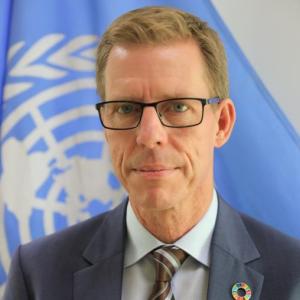Thank you to the colleagues from the media for joining us today for this briefing, acknowledging the pretense of several new colleagues on this.
We are to be co-hosting the upcoming virtual Brussels V Conference again as the UN, but I want to sincerely acknowledge the role played by the EU. We are co-hosts, and I do recognize that the EU is really driving this, particularly at the country level in terms of its progression, so thank you so much for your endeavors. I know it is not a small task, particularly these days when it is all online, which has never been done before in the history of this conference.
I do think that it is also particularly important now when we are commemorating 10 years of the Syrian crisis, when there are so many competing demands out there, so many competing crises, competing for everyone's attention, that we must recognize that we do not see a solution to the Syria crisis yet, and the impact of the Syrian crisis on Jordan is what it has been from the beginning.
I really think this is an incredibly important occasion for us, as an international community and all partners, to once again recommit to Jordan, and again acknowledge the absolutely unprecedented level of support that Jordan has provided to the people that have had to flee the Syrian crisis.
The level of hospitality to the refugees in Jordan, as I have said repeatedly, is unprecedented. I was quoted by saying the other day, that it is really a role model for many other countries in the world to follow.
Brussels comes up once again. I think that it is a huge challenge to do it online, to get the same feeling in the room as you would have had in Brussels, but I think in many ways you may argue that it is possibly even more important today, than it was previously.
2020 and the COVID pandemic, and as it continues in 2021, has exacerbated all the pre-existing vulnerabilities, and some of the most vulnerable people living in Jordan are the refugees.
We want, from the UN side, to underline and acknowledge that I think that we, as an international community and partners to Jordan, continue to support the refugees. We have no choice but to continue to stand up and really pursue the efforts that we have put in place over the last many years. There is simply no time for complacency either.
Saying that, from the UN side, very specifically acknowledge the unprecedented level of support by the international community as well. What we often call our donors, I prefer the term financing partners, are also providing an unprecedented level of support, all based on the Jordan Compact that came about back in 2016 /2017 and really has been the blueprint on how we have taking things forward in Jordan.
At the stage at which we are today, I think it is extremely important that we recognize and acknowledge that, as the situation becomes more retroactive when we are 10 years into the crisis, we are then continuously adjusting the way we are responding to the crisis.
That is why from the UN, we have been very keen trying to see how we can then blend our humanitarian support, with the development response that the international community also is providing to Jordan. This is actually what we often call a nexus. When you blend and look at this not as either humanitarian or development, but actually a situation that we have to address together, with all the existing modalities and mechanisms that we have.
That is to say that we have, during COVID, recognized that the Syrian refugees are part of this response. To say that back from March 2020, we had to acknowledge that we cannot only respond to the immediate health crisis of COVID. We had to simultaneously respond to the health dimension of COVID while we, and very much where the UNHCR were in the lead, on continuing with the lifesaving assistance to the most vulnerable people, primarily the refugees, while we were then looking at the Socio-Economic impact of the crisis of COVID on the population of all people living in Jordan.
That is where we are today, we are beyond that first phase and now, it is about the socio-economic impact on people, Jordanians, and other people living in Jordan alike. Are we going to be able to respond in a sustainable way? So that we can actually emerge from the COVID pandemic in a situation where people are less vulnerable and the society is more resilient to other crises as they come.
Since the Jordan Compact from 2016, here we are now, five years later. We had the Jordan response plan, and when we speak about the resource mobilization dimension of Brussels, we know that the JRP is the most important instrument for catalyzing resources for the response in Jordan. As the UN, we very much hope that the unprecedented levels of support will continue at Brussels in 2021, despite the competition that we see globally.
It is really an absolutely unique incident that we have developed over these years, in a way that we now see the integration of sustainable development and/or the refugee and migration compacts. I think that is really the way to go.
So, thank you to the EU for your lead in this cohosting arrangement. Once again to reiterate from the UN our support to Jordan and our acknowledgment of the unprecedented way that Jordan has supported to Syrian refugees.




